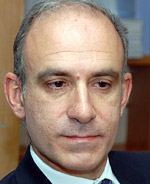“I have no number to give you, but what I am hearing from different analysts is that the shadow economy in Armenia could be an equivalent of as much as 35 or 40 percent of GDP,” Aristomene Varoudakis, head of World Bank Yerevan Office told a news conference. “And of course, it is a very important challenge to formalize this informal economy so as to increase tax revenues and be able to pay for much needed social services.” He said the shadow economy and the resulting tax evasion is one of the most serious problems hampering Armenia’s economic development. Varoudakis said companies involved in the shadow sector would also benefit from the legalization and transparency of their operations. “And people working for those businesses will be better protected,” he argued. Both the World Bank and the International Monetary Fund have long been pressing the Armenian authorities to improve tax collection. The authorities’ tax revenues have grown steadily and considerably since the late 1990s, but they remain very modest in relative terms. The revenue total was equivalent to only about 16.5 percent of GDP last year. Varoudakis said government action is especially needed in Armenia’s export-oriented mining industry. “Now the mining sector is rather undertaxed in Armenia,” he said. “Taxation regime in the Armenian mining sector is way below the international best standards.” The World Bank official said the government has pledged to remedy the situation with major changes in Armenia’s tax legislation regulating the work of mining companies. The planned reform will be financed from a $25 million budgetary loan which the bank plans to allocate to the government this year, he said. This example once again comes to prove the “scheme,” which the international organizations, including the WB work with the Armenian authorities. It means that they from time to time speak about the shadow in this or other branch of the economy, monopolies and oligopolies and rush to provide another tranche. In the offices of the WB and other international structures they good and well know that all the big businesses, including the mining sector, belong to pro-governmental oligarchs. So they provide several million dollars to the same government to take out the oligopolies from the shade. This is a real “structural reform.”

